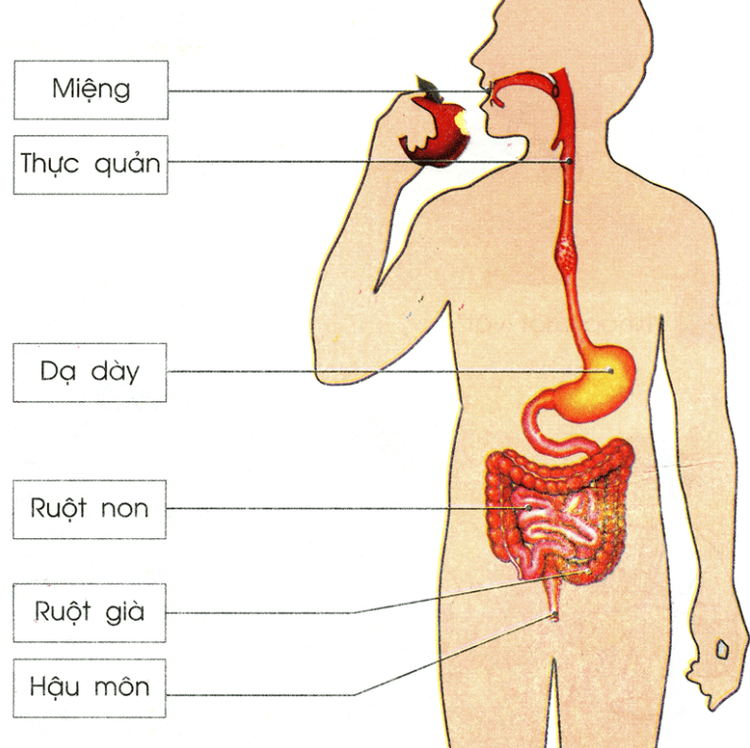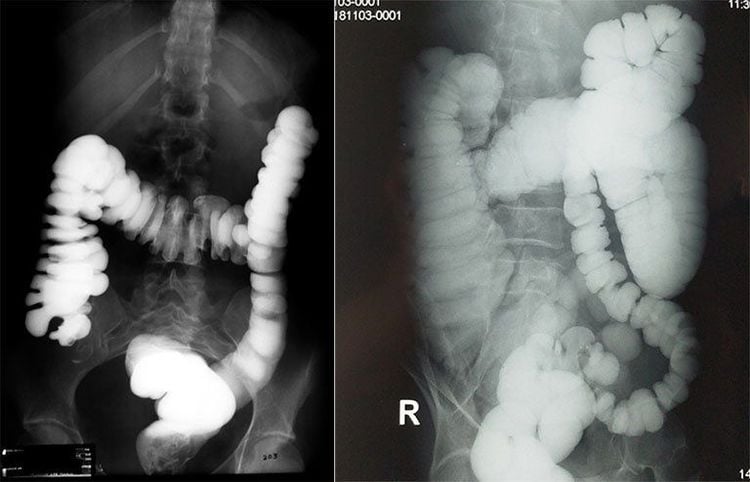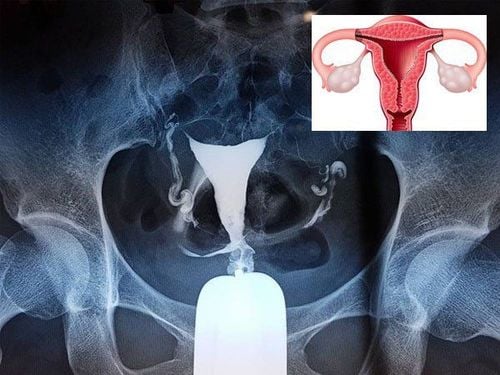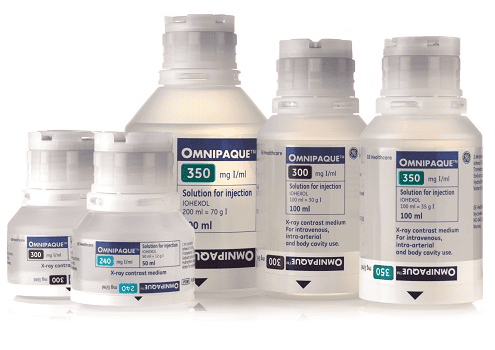This is an automatically translated article.
The article is professionally consulted by Master, Doctor Lam Thi Kim Chi - Department of Diagnostic Imaging - Vinmec Danang International General Hospital.
X-rays help your doctor see structures inside your body. With a contrast-enhanced colon X-ray, your entire large intestine will be shown more clearly to assess local lesions or disease. However, in order for the contrast-enhanced colon X-ray image to be highly effective, you should master the following things you need to know.
1. What is a Contrast Colon X-ray?
Contrast colposcopy is an X-ray test that can detect changes or abnormalities in the large intestine (colon) when contrast is injected. This is one of the imaging methods to effectively support the diagnosis and treatment of colon diseases: such as inflammation, cancer, colon polyps.
Contrast is a liquid that is injected into your rectum after the entire colon has been prepared. This medicine contains a metal substance (barium) that coats the innermost lining of the colon. Normally, X-rays are very poorly reflected in soft tissues, but when the barium is present, the colonic framework will show up very clearly.
In the case of barium is contraindicated, air can be injected into the colon, widening the lumen and improving image quality, the lesions are visualized more accurately. Air is not a contrast agent by nature, but this technique is still known as an air-contrast colonoscopy.

Vị trí đại tràng (ruột già)
2. What is a colon X-ray for?
Currently, contrast-enhanced colonoscopy is still widely used besides modern methods such as colonoscopy, computed tomography.... But not all cases are indicated by X-rays, it is only conducted when prescribed by a doctor based on the results of clinical examination as well as the patient's health status and age. The doctor may order a contrast X-ray to determine the cause when the patient has the following signs and symptoms:
Abdominal pain Rectal bleeding Change in bowel habits Loss of weight Explainable Chronic Diarrhea Persistent Constipation In addition, with a contrast X-ray of the colon, the doctor can detect conditions such as:
Abnormal growths in the lining of the intestines (polyps) Tumor on the intestinal wall, indistinguishable from benign or malignant Inflammatory bowel disease Intestinal X-ray should not be performed with contrast in the following cases:
Patient is suspected of perforation of the intestine, has signs of intestinal volvulus, infarct mesenteric blood. The patient has had an allergic reaction to contrast material in previous X-rays.

Người bệnh xuất hiện triệu chứng đau bụng
3. How to prepare for a colon X-ray?
Before your colon X-ray, you will be injected with barium with a completely empty colon. Any residue in your colon can take up part of the contrast medium and obscure the X-ray image, making it easy to mistake it for an abnormality.
To empty the entire colon, you will be guided to follow these steps:
Formulate a special diet, absolutely no fiber but only digestible nutritional ingredients be completely in the day before the procedure. You may be asked not to eat and drink only clear liquids - such as water, tea or coffee, without milk, cream, soups or carbonated drinks. Complete fasting after midnight, which means you must not eat or drink anything for at least 12 hours before the procedure. Take a laxative the night before the procedure. The medication can be in pill or liquid form, which will help empty the entire colon.

Người bệnh được uống thuốc nhuận tràng
Use an extra enema when in some cases, the evening or a few hours before the procedure, you need to clean to remove any residue in the large intestine. Ask your doctor about any medications you are taking as you may be asked to stop taking them a few days or hours before the procedure.
4. How does a colon X-ray take place?
4.1 During the procedure After the enema has been administered, you will be put on a gown and asked to remove your glasses, jewelry, and removable dental appliances. The colonoscopy will be done by an X-ray technician and a doctor who specializes in imaging studies.
You will start the procedure by lying on your side on a specially designed table. First, a little lubricant will be put into your rectum. The barium tube is then injected into the colon. This tube has a small balloon attached near the tip on the outside of the body to help keep the barium inside the intestinal tract. As the colon fills with barium, you may feel the urge to have a bowel movement. However, the best thing to do is to keep the medication in place by practicing relaxation, taking long, deep breaths.
Next, you need to rotate and hold the posture in different positions on the table with the guidance of the technician. This will help ensure that your entire colon is covered with barium and allows your doctor to view your colon from many different angles. Sometimes, you also need to hold your breath to create pressure in the abdominal cavity to make the procedure more convenient. Alternatively, the doctor can press firmly on your abdomen and pelvis, manipulating the colon for a better view on a monitor attached to the X-ray machine. Some X-rays will likely be taken from the colon from different angles.
The entire process of having a contrast-enhanced colon X-ray usually takes about 30 to 60 minutes.

Thuốc cản quang dùng trong điện quang
4.2 After the procedure If the doctor determines that all the necessary information has been collected, he will give the signal to end the procedure. At this time, the amount of barium will be expelled from the intestinal lumen through an enema tube. Once the tube is removed, you will be able to use the restroom to quickly flush out more barium and air. Any discomfort will quickly subside and you can return to your usual diet and activities immediately.
Also, one thing to know is that you may have white stools for a few days as the body will need to remove any remaining barium from the intestinal tract in a natural way. Besides, barium can cause constipation; Therefore, you should actively reduce the risk of constipation by drinking more water in the following days or taking a laxative if necessary. On the other hand, you should be re-examined soon if you have not been able to have a bowel movement or bowel movement for more than two days after the contrast-enhanced colon X-ray or your stool has not returned to its normal color within a few days.
5. Results that can be obtained after a contrast-enhanced colon X-ray
The results of the contrast X-ray will be sent back to your treating doctor. At this time, the doctor will advise according to the following situations:
A contrast-enhanced colonoscopy is considered negative if the radiologist determines that there is no abnormality in the entire colon. your colon. However, depending on the case and clinical symptoms, the doctor may recommend re-scanning after a certain time.
A colonoscopy is considered positive when the radiologist finds abnormalities in your colon. Depending on the characteristics of the findings, you may need additional testing, such as computed tomography, endoscopy, or even a biopsy for a more thorough examination. If your doctor is concerned about the quality of your X-ray images being substandard, you may need a repeat contrast-enhanced colon X-ray or another imaging test.

Kết quả chụp Xquang đại tràng cản quang
In a nutshell, X-ray of the colon with contrast is aimed at detecting diseases or abnormal lesions in the colon when you have symptoms such as pain, constipation or blood in the stool... This medium looks generally less invasive and less uncomfortable than invasive procedures such as laparoscopy; however, you need to follow the pre-shooting instructions for thorough preparation and the best image quality.
MSc Doctor Lam Thi Kim Chi graduated with a Master's degree in Radiology - Hue University of Medicine and Pharmacy and has over 6 years of experience as a radiologist. Dr. Chi used to work at Da Nang Obstetrics and Gynecology Hospital before working as a radiologist at Vinmec Danang International General Hospital as it is today.
For detailed advice on contrast X-ray methods, please come directly to Vinmec medical system or book online HERE.
Reference source: webmd.com; mayoclinic.org
Recommended video:
Periodic health check at Vinmec: Protect yourself before it's too late!
SEE ALSO:
What is an X-ray: All you need to know Before and after contrast injection: What you need to know Prolonged constipation and supportive measures What does X-ray affect to health?














